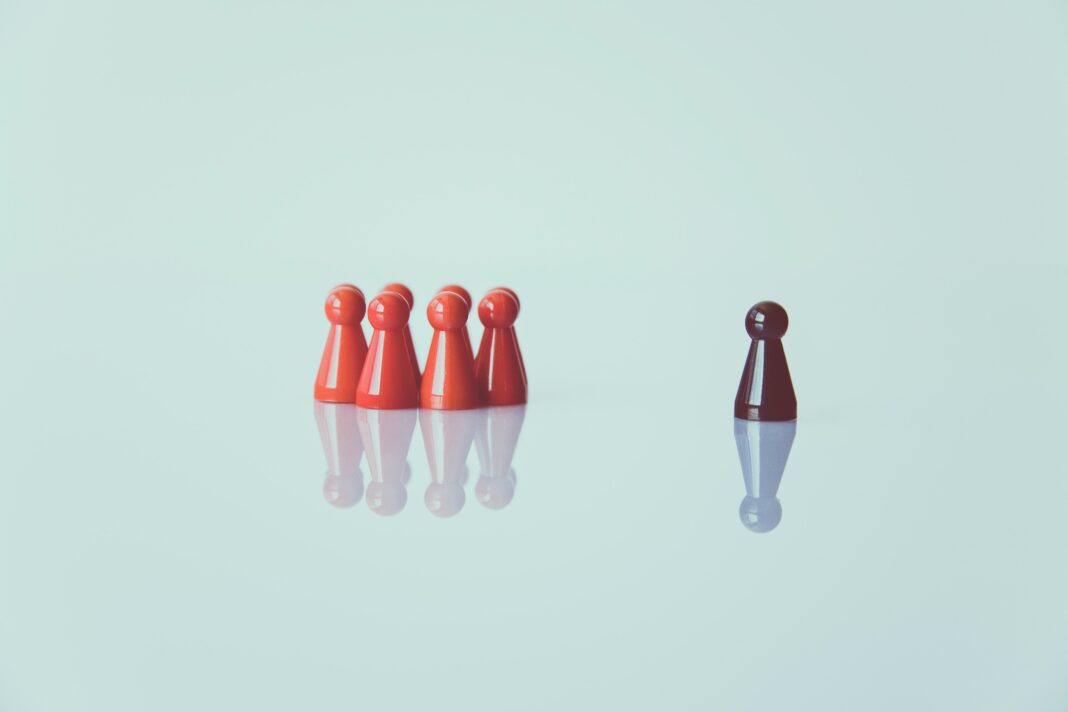EDITOR’S NOTE:
This article has been reposted from the Manchester Museum Our Shared Cultural Heritage blog: https://sharedculturalheritage.wordpress.com/2020/04/24/colourism-community-racism/
Colourism
I wish I had known the meaning of colourism growing up: just to be reassured that someone negatively commenting on the colour of your skin wasn’t my flaw. Growing up, I perceived it as someone calling you ugly rather than racism. But it was racism within your community due to centuries of oppression and colonialism.
Experiencing colourism at such a young age was difficult as race wasn’t something which I could contextualise at that age for me to reason my emotions, and feel as if it was a societal problem rather than my own. These experiences and comments led me to internalise that being dark skinned equated to being ugly – inevitably impacting my self-esteem. There were many days where I would look in the mirror and wish that when I was older my skin colour would change and lighten.
Growing Up
From a young age there were many instances where family and friends remarked about the colour of my skin. Some would just straight up ask me: why are you so dark? Why have you gone darker? Are you stressed?
The privilege and power to blatantly say that in conversation to me. It made me run to my room and cry. I didn’t understand racism properly, therefore wanted to change myself because of such judgements. I used to cry in the mirror and hoped my skin would be lighter when I was older. Even when my family just told me to ignore the hurtful comments from other family members. It was as though they didn’t know how to confront colourism in the community.
Comparing the skin colours of my siblings was a form of small talk when visiting family friends. In 2009, when my youngest sister was born, she was the cutest baby… she was also fair skinned. When people came to visit her, everyone complimented for her skin shade and made comments how she would grow up to be beautiful. She was nicknamed snow white. At the age of 8 I realised that they equalised being more beautiful to having fairer skin. I remember feeling selfish that I was upset the day everyone was so happy she was born.
Being seated next to my grandma and older generations was the worst at a wedding. My grandma didn’t say much to me about my skin colour, however sitting next to her listening to unprovoked criticism of brides and stating that a male (whether light skinned or dark) could have done better. This criticism evidently was regarding skin colour as they did not know the new bride on a personal matter what so ever and merely commented negatively on the dark-skinned brides.
Bangladesh
In the summer of year 8, we visited Bangladesh for my uncle’s marriage. I was excited as I had never been to any of my uncles or aunties weddings so my sisters, my cousins and I had planned our clothes and makeup months ahead of our trip. My auntie had booked my older cousins and I to get our makeup done at a beauty parlour. I was nervous about this because I just always thought I didn’t suit make up. Looking around the parlour there were many pictures of pale Bengali girls with makeup on.
After the beautician was finished with me, I put my glasses back on to see she had used the whitest shade of foundation on my face. I looked grey; the colour on my eyelids looked so ghastly due to the white underneath. I hated how I looked. I asked her if she could change it and use a foundation that was closer to my skin colour. She refused stating this look suited me. I felt I looked dreadful but my aunties in Bangladesh said I looked good.
The consequences of colonialism are visible in Bangladesh: the need for a closer proximity to whiteness has gone global. Comments about not staying in the sun for too long in Bangladesh make sense to me now as this supposedly was to ‘protect’ me from getting dark.
Although the extent of makeup isn’t as bad in the UK. It is still dire. In my local shops, the range of foundations is appalling. Up until Year 12 I held the belief that makeup was something which didn’t suit me because I was never matched to my foundation shade properly. I would say that the range of makeup is improving now with products such as Fenty Beauty and other new brands. However now it is always the case of having to buy high end and expensive make up products such as Nars or Mac to get the right shade. Thus, demonstrating the lack of consideration for the need for affordable make up. Yet again people of colour suffer when it comes to consumer choice, and our confidence is impacted.
Media Representation
Asian representation was next to nothing on British TV when I was growing up which was problematic in itself. But Bollywood movies and casting played on my mind. There was never a main character who was dark skinned, despite all the characters being Indian. There were three opportunities when they were casted: if they were poor-they were dark skinned, if they were evil, they tended to be darker skinned and if they were comical caricatures, they were darker skinned. There were no darker skinned ‘good’ or empowered people. What do you imagine to be the impact on young people of colour of such racist media representation? For one, it becomes socially acceptable to mock and ridicule dark skinned people.
‘Jokes’ such as ‘when you turn the light off you will only be able to see her teeth’ stuck with me as a child. It did get to the point where I didn’t want to look like I was offended and just wanted to laugh as I didn’t want to seem weak by getting upset. Also, because these were jokes that my cousins also laughed along with, I couldn’t find a way to explain or justify how I was upset because they too were Asian, like me, so how could I get offended. But I could and I did.
These apparently harmless jokes about skin colour have a lasting effect and change people’s perceptions of themselves no matter how much being dark or having tanned skin is now socially acceptable. These jokes destroy confidence, make you want yourself clean. The Bengali word for fair skin is clean: ‘saaf ‘. Every time I hear someone mention that word it infuriates me how a language can be internally racist. This word can impact you despite feeling that you are educated from right to wrong on race related issues.
Resisting and Challenging Colourism
After years of experiencing colourism and racism, in Year 12, I fought back. We were joking around in my cousins’ group chat and then a reply came mocking my skin colour with an emoji. After seeing my educated supposedly ‘woke’ cousins who would ordinarily tweet about racism not say a word, not challenge the colourism, but instead proceed making jokes about a different topic. For them to ignore the comment, and not defend me, made me feel devastated.
It felt so humiliating. In that given moment I felt so angry that they could respond to all the jokes and other conversations but no one could ever defend me. I just thought previously that when we were young, they didn’t understand but now we were grown up. They made me again feel like it was my own personal problem, and just because it didn’t affect them, they didn’t need to respond as it would blow over. I left the group chat.
Although I left the chat, I felt angered and upset for a long time. I was crying and frustrated with myself. I was in Year 12, and I understood racism and colourism wasn’t a me problem, but a social problem. But I still felt sad about my skin. I had thoughts these jokes didn’t happen anymore. I was taken back to my childhood and the trauma of colourism.
Since then I explained everything to my cousin, who was very apologetic. We made up, but it reminded me that he still didn’t get it: ‘I’m really sorry, I didn’t want to make you feel upset I just said it because I thought you could take it’; ‘I’m Asian as well’; ‘I go so dark in the summer’. I explained this was not the same, and he proceeded to agree and apologise. However, I just knew he didn’t get it. I couldn’t have changed his perception of darker skin and make him see differently. More that, now I didn’t want to.
I don’t want to have to educate people that dark skin isn’t ugly. Thinking about that concept of me patiently explaining how I feel, how colourism makes you question your existence is beyond me now. It’s not my job to encounter such emotional trauma time and time again teaching people around me about the colonial legacies of colourism and racism.
My auntie – who was married into my family when I was in Year 7 – helped me to understand concepts such as ‘race’. When she was working on her PhD, she would discuss topics such as identity and racism with me. Talking to her gave me a space where I felt I easily talk about my personal experiences. I felt heard and justified. She let me express my thoughts without feeling bad or having to remind myself that these people weren’t bad people. She shared with me the age old notion of Asian aunties’ barbed racist comments. Of course, I knew this all from a young age, but hearing my aunty talk of it as a social problem made it feel real and I therefore didn’t feel bad that I got so angry about this topic.
One thing that angers me now is when opening up to some of my friends they seem to get it, but then really don’t. With one white friend, we have discussed the issue of colourism: from snap chat filters that lighten your skin to use of skin bleaching products in other countries. I felt so happy that my friend was shocked and horrified. However I was later reminded me that they still didn’t get it, when the friend posted a seemingly trivial meme about ‘looking racially ambiguous in comparison to wearing a natural looking tan’. And probably had no idea how problematic this meme is. People get frustrated about racism and colorism when it suits them or when they have another to get angry at, however when beauty standards seemingly change and it is in trend to “blackfish”, then they forget the bigger picture.
It’s difficult to blame certain individuals as it’s a societal/structural problem. These current issues such as “blackfishing stem from stealing during colonial times, and from notions of cultural appropriation. The same patterns apply as history is repeating itself as now we have those are trying to replicate/ steal skin colours. Thus, demonstrating beauty standards have changed but only through a Eurocentric lens and validation. The easy access for white people being allowed to dip in and out of different colours, yet never being discriminated against for doing so indicates the ease of change of beauty standards in the West. And yet in former colonised places and for former colonised people there is no such ease, and skin colour impacts every facet of their lives.
No Sociology Without History
Colonial perceptions of beauty have long been embedded within Asian communities. This has rooted from British colonialism and the long-lasting effects are still felt today around the world. Colourism derives from the European context of colonisation and the beauty standards enforced. The notion to be lighter is equalised to a closer to proximity to whiteness. This has been in place since slavery where lighter skinned slaves had less strenuous tasks and escaped slavery sooner whereas the darker skinned slaves performed more difficult tasks. In South Asia, decades of colonisation reinforced white supremacy in which lighter skinned Asians were favoured and had extra advantages. The British East India even named their settlement at Fort St George ‘’white town’’ and their Indian settlement ‘’black town’’ .
The fight for independence must still continue, the mindset must change. How can we be free whilst abiding by the terms and conditions that white supremacy has constructed? The notion of whiteness has created a consumeristic benefit from either western ideologies or for the west. For example, people pay more for surrogates who are fair – even though they provide no genetic material . The largest and fastest-growing markets for skin bleaching products are in the Asia-Pacific region, and is a global, multibillion-dollar industry in India. Global spending on skin lightening is projected to triple to $31.2bn (£24bn) by 2024.
As long as these colourist notions are intact capitalism and white supremacy is benefiting. For the people who claim to be tired that colourism is another word that has been added into this “pc woke” world in which we are “snowflakes” in a time of overly sensitive “millennials”, I remind you this is in the same time where chemical peel laser treatments and steroid cocktails cosmetic creams are being used. This interrupts the production of melanin can damage the kidneys and brain if absorbed by the skin and accumulates in the body . It’s deadly.
Deaths from The Result of Colourism:
- ‘Suicides have occurred; A 21-year-old Indian woman has allegedly killed herself because of constant harassment by her husband over her “dark complexion”, police said.’
- ‘And in 2018, a 14-year-old girl took her own life, reportedly after her classmates bullied her and called her “ugly” because she was “dark”.’
- ‘A 29-year-old woman killed herself in 2014 after her husband taunted her over her skin colour, police said.’ (BBC News).
Conclusion
How much longer can we ignore or shut down voices who speak against colourism and racism? When will we prevent young people’s self-esteem to be damaged? When will we actively challenge seemingly harmless compliments about having fair skin? When will we see a change?
Samihah is currently an undergraduate studying Sociology and History at the University of Leeds. She is interested in researching social issues, especially race related issues such as colourism.












